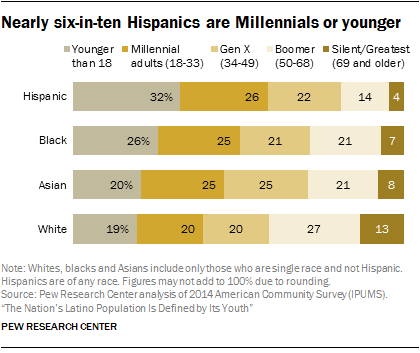Millennials from communities of color have better mental health than their white counterparts, research shows

When Mariana Cid De Leon Orvalle left her home in Texas for the sunny shores of San Diego, she longed for the community she had left behind.
She was newly pregnant. She missed her family.
But it was her family that came to her rescue — even from far away.
Her mother-in-law connected Orvalle with friends she had in the San Diego area. Those friends became Orvalle’s stand-in family.
“Community has always helped me even when I thought I was alone, they’ve always been there,” said Orvalle. “Once we connected [with my mother-in-law’s friends], they brought us in and we formed our own community and I felt like I was at home in a way.”
A new survey from the Centers for Disease Control and Prevention suggests that millennials from communities of color have better mental health than their white counterparts — reversing a longstanding trend.
“Because there’s been such a toxic pattern historically with the community of color with the Latinx community there’s this culture of ‘you don’t talk about things’ and I feel like our generation is the one that’s going in the opposite direction where actually when you talk about things you gain back your power,” Orvalle said. “So for me, I’m the opposite where I want to talk about issues, I want to bring them out into the open, I think that’s how you heal and move forward.”
Listen
When it comes to health disparities, people of color have historically suffered from chronic diseases — like diabetes — and premature deaths more than their white counterparts. The recent CDC health survey shows that this role has reversed among Millennials. It is not immediately clear why, researchers said.
“This is just a hypothesis: I think it’s because there’s so much more social support within the Latino, American Indian and African American communities,” Lucero said. “And we know the social support is protective for mental health. There’s also a lot of stuff going on with the white population. I think there’s a lot of fear, there’s a lot of discontent and that might be increasing their mental-health issues.”
Latinos are the nation’s youngest and largest ethnic group, according to the Pew Research Center, and about a quarter of the nation’s Hispanic population are Millennials.

They are part of a generation that is “seeing more and more mental health issues,” said Julie Lucero, associate professor in the department of community health sciences at the University of Nevada, Reno, and the director of the Latino Research Center.
“They’re also the most diverse,” she said. “Well, they’re a much more diverse than those that have come before them generation X, the great generation, baby boomers, and right now they’re the largest living population cohort because baby boomers are starting to die off. So they have a lot of power. There’s a lot going on with this generation.”
Listen
Kaitlyn Jakola, an assistant managing editor at Business Insider who attended the Excellence in Journalism conference in San Antonio this week, says she — a Latina Millennial — is not surprised about the findings showing lower rates of mental health issues among millennials of color.
“I think communities of color have been leading the way in conversations about issues in society and the impact they have on us as people of color, and so it’s not surprising that especially young people would be leading the way in confronting issues and dealing with them and getting their mental health figured out,” said Jakola.
Listen

Millennials also seek therapy more often than previous generations.
Ronald Lopez, professor and department chair for Chicano and Latino studies at Sonoma State University, said that while older Latinos may not have sought traditional therapy, they may have benefitted from a different type of healing.
“I think [being Latina has] made me have to deal with issues in a different way like figuring out how to talk to my family about [mental health], how to talk to my mother about it specifically,” Jakola said. “And it’s made me feel a little bit like an advocate to talk to my parents about mental health, and show them how to have those conversations.”
Orvalle eventually moved back to Texas, reuniting with her family, community and friends.
But, she said, she has learned that wherever she goes, if she can find community, she’s not really alone.
Jazmin Orozco-Rodriguez is a 2019 Student Projects participant. She is a recent graduate of the University of Nevada, Reno. She interned for KUNR in Reno, where she reported stories in English and Spanish, and freelances for the Nevada Independent. Reach her at jorozcorodriguez@nevada.unr.edu and on Twitter at @jazmin1orozco.